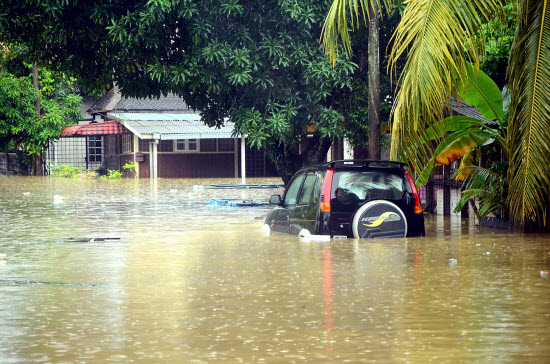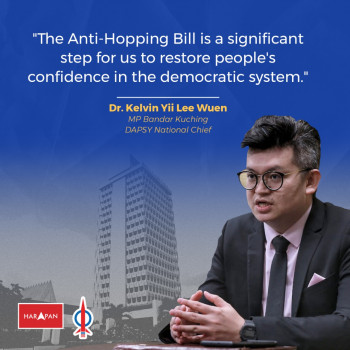By Ralvin Manikam
The recent floods that devastated most of the East Coast has taken lives, and destroyed the livelihood and homes of many.
But instead of admitting that flood preparedness is necessary, some factions have decided to add a religious ‘twist’ to the causes of the calamity.
PAS Pasir Mas MP Nik Abduh Nik Abdul Aziz for instance, said the floods were a reminder for Muslims to fear Allah and “avoid his wrath”.
“It justifies the Kelantan government’s steadfastness in implementing Hudud,” he had said in a Facebook posting.
Apart from Nik Abduh, PAS President Abdul Hadi Awang, also had no qualms about saying that the floods were a heavy test from God.
While the comments of religious leaders on serious issues may amuse or anger readers, it lays bare an apparent lack of focus on flood mitigation and disaster preparedness in Kelantan, which is also one of the poorest states in the nation.
The state leadership has blamed everyone from the Federal Government to the failure to implement Hudud, and even God for the disaster; but the question is whether the state and the people living in flood prone zones know even an inkling about disaster preparedness, to deal with the great floods of Kelantan.
Shouldn’t the people who face floods on a yearly basis, be educated on flood preparedness?
Captain K. Balasupramaniam, founder of Malaysian Volunteer Fire and Rescue Association (MVFRA) says yes.
According to Captain Bala, as he is fondly known, people have to firstly be taught to leave the premises, even their homes, when flood hits.
In his experience in flood-hit Ipoh this year, many elderly couples refused to vacate their premises despite warnings from authorities.
“These couples have children who moved to Kuala Lumpur or Selangor to work, and it is they who should educate their parents to move, and not stay on at home in times of disaster,” he told The Rocket.
Understandably, those above the age of 60 may find it hard to adjust to living in an evacuation facility like a house of school, where the same comforts they have at home do not exist.
“Some of these facilities, like schools and community halls, have toilets that are not kept in the best of conditions,” he explained.
He said although the government has done what it can to channel resources to these centres, convincing the elderly to relocate to these designated areas is a difficult task.
Captain Bala and his team conduct training for disaster preparedness, includes floods. One of such event was held in Cheras Leisure Mall recently.
During the training, he simulates situations that could happen during the floods and guides participants to act accordingly to ensure their safety.
Back in Ipoh, he said that the disaster preparedness levels were still at a “crawling stage”. This is where non-governmental organisations (NGOs) such as MVFRA could step in if the state or corporates summon and support the group.

The MVFRA, helmed by Captain Bala (pic) acts as a secondary back-up team to the fire and rescue department to help disaster victims. (pic from www.mvfra.org)
By his own admission, training sessions like these sometimes fail to gain the traction it needs from the people. Yet, he said that organising such activities in flood prone zones could save lives or prevent injuries.
In a double storey house where its ground floor is submerged under water, how do victims secure a safe area before escaping the premises?
“People would instinctively run to the first floor, but they don’t realize that that is also where cockroaches, rats, and snakes would have escaped to. So we would teach you how to secure such a parameter,” he said.
Apart from that, he said that flood victims may need to create a floating device to prevent them, their animals or their infant child from drowning.
“We will teach you how to create a floating apparatus with mineral water bottles.”
Explaining that one bottle can float about 2.5 kg of mass, he said that one could use three water bottles to make sure babies don’t drown when they accidentally slip and fall into the water.
The same floatation device could be attached below animal cages, for pets, so that in the event of a flood, their lives could be spared too.
NGOs like Captain Bala’s can play an instrumental role if they are called on by the state to educate the public, especially the East Coast states that experience floods every year.
Captain Bala suggests that a concert-like event can be held with flood disaster preparedness activities, so that the event attracts public interest, as he has experienced before.
“You can pull in crowds provided the whole event is interesting,” he said.
He also added that politicians and the elected representatives should work with NGOs and corporates to organise such initiatives in their respective towns or villages. Engaging with NGOs he says, is necessary as they work “super fast” compared to state authorities.
“NGOs move very fast, decisions are made over Facebook and in mamak stalls, compared to state authorities who need to convene for a meeting and ponder the issue before making a decision,” he opined.
One way to get started is to be sensitive about weather patterns and request NGOs to step in and teach the locals what to do in case of such a crisis. While the blame cannot be put solely on authorities for the displaced 230,000 and 21 deaths, the state must take flood preparedness education seriously and call in experts such as the MVFRA to generate awareness and provide solutions to potential flood victims.
“Politicians, and state leaders, can extract ideas from NGO’s and reach out to the people effectively.”
“And by that I don’t mean that they should just chair the event; they should also be directly involved in educating the people,” he added.
Captain Bala was also quick to say that any educational events should be done solely to educate the people and not be “hijacked” by political rhetoric. Having faced such situations in the past, Captain Bala usually reminds the political ‘guests’ he works with not to sidetrack from the motive of a disaster preparedness event.
“If there is even one life lost during the floods, then we have failed – because people should not be dying.”
Leaders, whether from the state or the federal government, must take it upon themselves to facilitate educating the locals on future disasters that would hit their constituencies. Elected by the people, politicians must spearhead efforts like these to prepare the public for the recurring floods, instead of irresponsibly conjuring up supernatural explanations for a tragedy that claims lives.
–The Rocket




